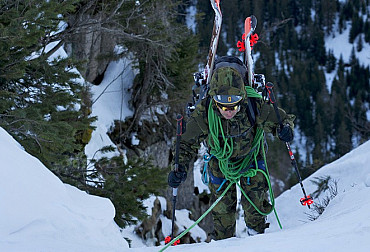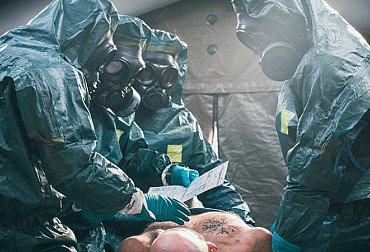Special training for our Engineers
Who is an Engineer and what is his task in the Army? Newcomers sought answers to these questions during the intensive training of the 152nd Engineer Battalion. Within two weeks, they got acquainted with all-army and professional areas provided by their unit.
"Before I came to Bechyně, I imagined an engineer to be basically only a pyrotechnician who places or destroys explosives. I must admit that I was very surprised by what the Engineer Battalion must provide," PFC Matěj Procházka, who joined the 1st Company of General Engineer Support in July as an engineer, says. He was most interested in building explosion-proof barriers. "You work mainly with wood, which you have to connect with barbed wire, for example, so that the barrier works. Even though it looks simple, this system of initial obstacle is very well thought out," Procházka adds.
 Picture: Formation of non-explosive barrier (ratchet) | Ministry of Defense of the Czech Republic
Picture: Formation of non-explosive barrier (ratchet) | Ministry of Defense of the Czech Republic
Earthworks and construction work of all kinds
At the 152nd Engineer Battalion, there are two companies that are destined for general engineer support. Their tasks are, for example, earthworks and construction work during the construction and repair of bases, areas of troops, transit camps and others. In addition, they build protective structures, trenches, modify and maintain main supply routes, remove obstacles or other non-explosive barriers, mainly using earth-moving machinery. "Therefore, we have also included reconnaissance or research in the training, during which they are able to find out whether the given path has satisfactory parameters. Above all, sufficient load-bearing capacity, height, width, inclinations, turning radii and possibly recommend a method of strengthening low-load-bearing parts, eg in the case of waterlogged sections with hoses," Ensign Libor Novobilský, Chief Ensign of the 152nd Engineer Battalion, specifies one of the parts of the program.
 Picture: Creation of an anti-landing non-explosion barrier | Ministry of Defense of the Czech Republic
Picture: Creation of an anti-landing non-explosion barrier | Ministry of Defense of the Czech Republic
Human power alone is not enough
Part of this preparation is also a correct estimate, even in terms of one's own strength. "They could try it at the end of the week, when they had to transfer the non-explosive barrier, the so-called dryer, which weighs 300 kg, to a water reservoir about 50 meters away. In the end, they found out that after taking two pieces, they had had enough. In this way, we also wanted to show them how important in these cases the help of engineering technology and at the same time the logistics that correct it,“ sergeant Václav Zunt, training instructor, describes the main purpose of the last task.
 Picture: Strengthening communication with the help of hats | Ministry of Defense of the Czech Republic
Picture: Strengthening communication with the help of hats | Ministry of Defense of the Czech Republic
Tired of it? Reassignment within the corps is easy
Intensive training is a great benefit for newcomers to the corps. They can get acquainted with the space and objects of the unit and at the same time get acquainted with all the specialties. "Until then, for example, they had never worked with a pontoon, which is a specialization of the pontoon company. But now he knows what it is and how it works," Zunt adds. As he himself says, when someone is assigned to a certain position and finds out that he enjoys engineering work more, it is not a problem to transfer him to another position within the corps.
 Picture: Introduction to the pontoon bridge set | Ministry of Defense of the Czech Republic
Picture: Introduction to the pontoon bridge set | Ministry of Defense of the Czech Republic
The 152nd Engineer Battalion was established on 1 January 2020 and its main task is to fulfill the obligations of collective defense of NATO states within the framework of general engineer support. It consists of five companies (pontoon company, 1st and 2nd General Engineering Support Company, EOD Company, Logistics Company) and an Aid Station. The battalion also includes an Active Reserve Pontoon Company.





















